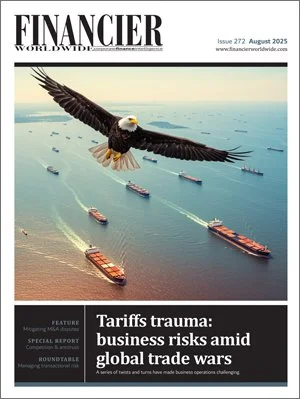Merger control and the rise of national call-in powers in the EU: what does it mean for M&A transactions?
August 2025 | SPECIAL REPORT: COMPETITION & ANTITRUST
Financier Worldwide Magazine
Long a consistent and reliable framework (although somewhat burdensome), the European Union (EU) merger control system is under threat of fragmentation – an evolution that can have significant consequences for M&A deals worldwide. As an increasing number of member states set up mechanisms that allow national competition authorities (NCAs) to review deals that would not normally be reportable under standard EU rules, the risks of post-closing challenges and diverging outcomes are on the rise.
EU merger control: predictability and legal certainty
Merger control refers to the process of reviewing mergers and acquisitions under antitrust or competition law. Today, over 130 nations worldwide have adopted a regime providing for merger control, and obtaining clearance from the relevant competition authorities is an important condition precedent in many deals.
In the EU, Regulation (EC) No 1/2003 of 16 December 2002 on the implementation of the rules on competition laid down in articles 81 and 82 of the Treaty (EU Merger Regulation) sets the relevant framework for the review of M&A transactions by the European Commission (EC), as well as the articulation of the EC’s powers with those of NCAs in the 27 EU member states.
For decades, the EU system has provided a consistent and reliable framework for merger control review, giving merging parties some much needed predictability in terms of process and timing. Under the EU Merger Regulation, deals are only reportable to the EC for merger review if they meet specific turnover thresholds, the main one being: (i) a combined worldwide turnover of all the merging firms over €5bn; and (ii) an EU-wide turnover for each of at least two of the firms over €250m. Reportable deals need to be notified to the EC prior to their implementation and must receive clearance before closing.
Deals that are not reportable to the EC may need to be notified to the member states, generally based on similar (but lower) turnover thresholds. For instance, in France, the rules require transactions that are not reportable to the EC to be filed with the French Competition Authority if the following thresholds are met: (i) a combined worldwide turnover of all the firms involved over €150m; and (ii) a French turnover for each of at least two of the firms over €50m. Other member states, like Spain and Portugal, have chosen to implement thresholds expressed in terms of market shares, with parties required to notify any deal that leads to a post-merger share above 30 percent or 50 percent in a relevant market.
Historically, deals that do not meet the EU or national thresholds could not be reviewed under merger control rules in Europe.
That system differs significantly from the one that exists in the US, where deals that fall below the Hart-Scott Rodino thresholds may still be investigated – either pre- or post-closing – by the Federal Trade Commission or the Antitrust Division of the Department of Justice if they believe the transaction may raise competition concerns, irrespective of the parties’ turnover or market shares.
While the EU system imposes an additional burden on companies that meet the relevant thresholds by requiring a formal filing, it also provides legal certainty, as a deal that is not reportable or has been approved by the EC or an NCA cannot be challenged post-closing under antitrust rules. As the European Court of Justice put it, the EU Merger Regulation “was designed to ensure a high degree of predictability and legal certainty” to the benefit of companies while making sure “that concentrations are dealt with by the most appropriate authority”. Today, however, that guarantee is under threat.
Closing the enforcement gap
Over the past decade, competition authorities in Europe, led by the EC, have identified what they perceive as a growing ‘enforcement gap’ in the EU merger control system. Because the thresholds are based on turnover or market shares, European agencies cannot generally review the acquisition of smaller targets, irrespective of the acquirer’s revenues or market position – which led to the perception that European enforcers may be missing ‘killer acquisitions’, i.e., acquisition by established players of start-ups before they can become credible competitors.
To address this perceived threat, the EC issued new guidance in March 2021, encouraging EU NCAs to refer potentially problematic mergers to Brussels under article 22 of the EUMR (referral of cases with an EU dimension) – without regard to the deals meeting the national merger control thresholds or not. France was the first member state to refer a case that fell below all relevant thresholds in the infamous Illumina/Grail case. However, in a much-commented ruling of 3 September 2024, the European Court of Justice invalidated the EC’s guidance and found that NCAs which do not have jurisdiction to review a case under their national merger control rules cannot refer that case to the EC either.
Following that ruling, the EC and the member states were left with two options: amending the EU Merger Regulation to close the enforcement gap or giving NCAs the powers to review any deal that may trigger antitrust concerns.
With the first option off the table for political reasons, as a change in the EU Merger Regulation would require unanimity of the 27 member states, NCAs have started working with national legislators to introduce so-called ‘call-in’ powers, i.e., the ability to review any deal that may negatively impact competition, either before or after closing.
The balkanisation of merger control in Europe
Call-in mechanisms are not entirely new in Europe. However, until very recently, they were strictly limited to smaller member states and very sparingly used.
Until 2021, only Sweden, Lithuania and Norway (the latter not a member of the EU but of the European Economic Area) had call-in powers allowing them to review deals that fell below their national merger control thresholds, provided they may have an impact on competition in their respective territories. These powers were seldom used, though – in the past two decades, the Lithuanian competition authority used them in five instances only – and generally limited to the review of small, local deals.
Since 2021, however, several additional member states have introduced call-in powers. Denmark, Hungary, Ireland, Italy, Latvia and Slovenia can now call in deals, with several more jurisdictions actively considering it, namely the Czech Republic, Finland, France, the Netherlands and most recently Germany.
In most of these jurisdictions, the NCAs may exercise call-in powers without needing to demonstrate any turnover or presence of the target business in the local jurisdiction, as long as the transaction may impact competition in a relevant market. The post-closing duration for which NCAs may exercise their powers varies, from three months in Denmark to two years in Sweden – but in all cases NCAs may order divestitures or invalidate the deal to remedy competition issues.
Some NCAs have been quick to use these new powers, triggering significant uncertainty for merging parties. While Ireland was expected to be the most active NCA as it hosts the EU headquarters of most tech giants, Italy has taken the lead so far: between the introduction of its call-in powers in 2022 and 2024, the Italian authority reviewed no less than eight deals and sent one (the acquisition of digital start-up RunAI by Nvidia) to the EC under article 22.
While so far none of these transactions was blocked (including Nvidia/RunAI, which was approved by the EC without remedies), the process creates significant uncertainties and delays for the parties, which do not know whether their deal may be called in, what impact this may have on the timing of their transaction or which remedies they may eventually need to offer.
What is even more troubling is that, although call-in was initially supposed to be limited to exceptional situations involving potential killer acquisitions in innovative sectors, experience shows that NCAs are actually keen to use their powers to review deals with a much more limited scope in traditional industries. Beyond the most publicised Nvidia/RunAI deal, transactions reviewed in Italy so far cover very different sectors and tend to focus on local geographic markets rather than larger, international transactions.
The risks associated are threefold. First, the possibility for a transaction to be called in needs to be assessed and, if need be, reflected in the deal documentation – which can be a challenge as more and more member states adopt similar but slightly different systems. Second, call-in has an impact on the timing of the transaction and can require the parties to offer remedies, which may not have been thought through in advance if the deal was not reportable. Third, there is a growing risk of divergences between NCAs: unlike the article 22 mechanism, which provides for deals to be reviewed exclusively by the EC, nothing compels NCAs using their call-in power to send the transaction to Brussels – which means that the same deal can be reviewed in parallel in several member states, with potentially diverging outcomes.
Should the largest member states, including France and Germany, follow this trend, as they seem poised to do, the merger control landscape in Europe may become much more complex to navigate and require additional caution and foresight from dealmakers.
Laurence Bary is a partner at Dechert (Paris) LLP. She can be contacted on +33 1 57 57 80 80 or by email: laurence.bary@dechert.com.
© Financier Worldwide
BY
Laurence Bary
Dechert (Paris) LLP
Q&A: Navigating dynamic competition in merger control
Shifting gears: a new approach to merger control policy in the UK and US
No deal too small: navigating US and EU scrutiny of below-threshold deals
US, UK and EU decisions buoy antitrust cartel enforcement in labour markets
Antitrust and information exchange: navigating without a safe harbour
The strategic shift in private enforcement of Canada’s competition laws
Legitimate cooperation vs anticompetitive agreements – ‘Green Deal’ or ‘Green Cartel’?
Priorities of the Belgian Competition Authority for 2025: an ambitious programme


